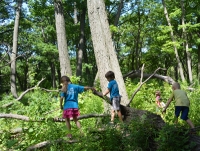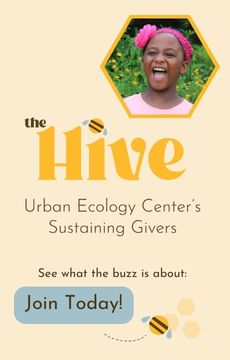Her teacher was smiling too, grateful that Mary, one of her class of visually impaired and blind students, could explore nature just like any other child.
Students who are blind and visually impaired take part in all of the Urban Ecology Center field trip activities. Shuffling into the river in hip waders to catch bugs and study water quality. Paddling a canoe to become familiar with a pond ecosystem. Pushing and stretching up the tower on our climbing wall to explore risk, team building and balance. Tapping maple trees to examine tree physiology. Snowshoeing on a winter ecology hike. Finding decomposers and learning about nutrient cycles. Everything!
According to Regina, “So much of teaching is visually centered. Our most challenging aspect of working with students who are blind and visually impaired was learning how to help them create an image of the environment around them via auditory, tactile, and olfactory senses.” With some adjustment, she and her colleagues developed safe, hands-on learning opportunities for these students. The result? Big smiles and engagement in the subject matter.
Every day our environmental educators create opportunities for students to tap into their natural sense of awe and transform their heart and minds as they connect to nature. It isn’t every day that they are awarded for their work. In a heartfelt ceremony at close of the school year, students with visual impairments from our partnering schools recognized two of our staff, Regina Miller and Matt Flower, with an award from the Wisconsin Association for Education and Rehabilitation of the Blind and Visually Impaired. Three different partnering schools (Gaenslen Elementary, Lincoln Middle School and Longfellow Elementary) came together to recommend Matt and Regina for the positive impact they have had with their students. We are honored and share our appreciation for Matt and Regina’s work with all students from our partnering schools.
You don’t need to be a school student or have strong eyesight to enjoy a visit to the Center. I am pleased to announce that we also now have a “Sensory Kit” at each branch designed to provide a hands-on tour using touch and smell rather than sight as sensory input. The kit combines information about the Center in braille with objects that capture the theme of each part of the tour. This was created by our Visitor Services team after Cheryl Orgas, Director of Audio and Braille Learning Enhancement (ABLE) expressed interest in partnering with us. In working with ABLE, the Visitor Services staff realized that some aspects of our branches were engaging and some were pretty discouraging for visitors who were visually impaired. The team took the feedback to heart, participated in trainings with ABLE and developed this new experience for our visitors. We are delighted to share it with you!
Like the young girl running across the field, we invite you to get outside to smell the sweet, earthy odor of autumn, feel yourself connect to nature and explore Center in this new way. Please join us!





